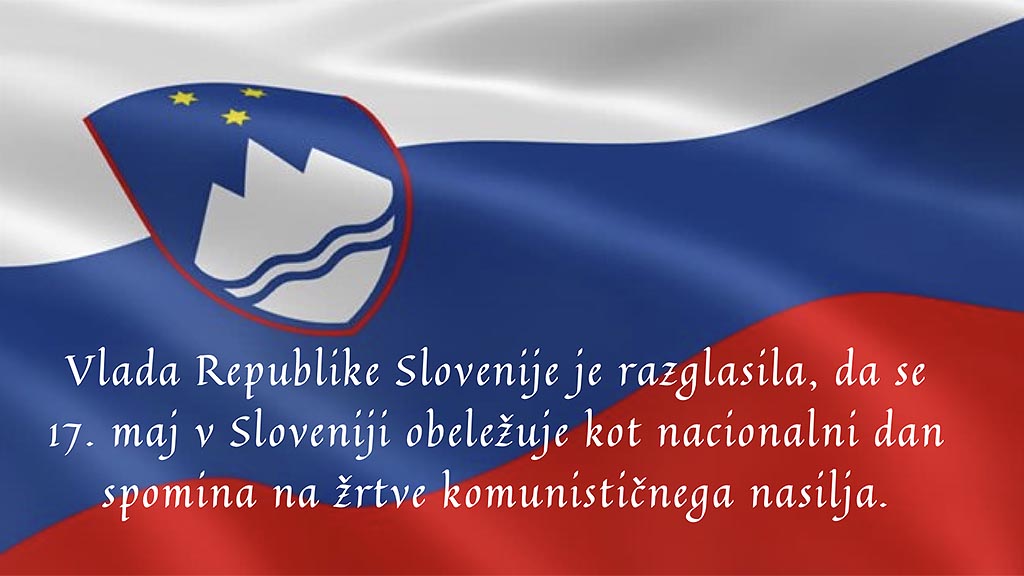By: L.K.F.
The Government of the Republic of Slovenia has announced that May 17th is marked in Slovenia as the National Day of Remembrance for Victims of Communist Violence.
On this day, the Museum of Recent History of Slovenia and the Study Centre for National Reconciliation prepared a round table with the participation of: the director of the Museum of Recent History, Dr Jože Dežman (remotely, via video), historian and publicist Dr Tamara Griesser Pečar, and historian, editor, and journalist Dr Jože Možina.
The conversation took place on Tuesday, May 17th, 2022, at 6 pm, in the Knight’s Hall of the Museum of Recent History Slovenia, at Celovška street 23, Ljubljana.
From the summer of 1941 to January 1946, communist violence in the territory of the present-day Republic of Slovenia claimed tens of thousands of violent deaths of civilians and prisoners of war. During the decades of communist rule, communist violence affected hundreds of thousands of people in Slovenia with all forms of violating human rights and freedoms.
The communist assassinations of individuals and families began in the autumn of 1941. The first mass communist massacre of Slovene civilians took place on May 17th, 1942, when 53 people, mostly Slovene Roma, were killed by partisans in the Iška gorge south of Ljubljana.
The massacre of May 17th, 1942, in Iška is thoroughly researched and historically documented. In 2017, the government commission for the issue of hidden cemeteries excavated the remains of the victims, the perpetrators are known. On that day, partisans of the 1st company of the Šercer Battalion killed 53 people – 49 Roma and 4 Slovenes.
This mass war crime is the first in a series of crimes in which the communist partisan movement committed serious war crimes and crimes against humanity against large groups of Slovenian civilians and later prisoners of war. These crimes peaked after the end of World War II in the spring of 1945, when more than 15,000 people were murdered in a few weeks or one percent of the population of then-Slovenia. In addition, in the spring of 1945 and later in the territory of the Republic of Slovenia, tens of thousands of prisoners of war and civilians of Croatian, German, Serbian, Montenegrin, Bosnian, Italian and other nationalities were killed.
In the process of transitional justice, the Republic of Slovenia paid symbolic compensation to some relatives of the murdered and rehabilitated them. A good part of the hidden slaughterhouses and cemeteries have been researched and arranged, and the Slovenian victims are mostly listed by name. But there is still not a universally established right to a grave and a memorial for all the victims of World War II and the communist terror after it. On the contrary, in the case of the Roma victims from Iška, the right to a grave is still grossly trampled on.
There is also no respect for the suffering of hundreds of thousands of Slovenians who were victims of other forms of communist violence during and especially after the Second World War. They are tens of thousands of refugees, exiles, both Slovenian and German and Italian minorities, more than a hundred thousand victims of violence by the secret political police, victims of concentration, labour, and other camps, Stalinist trials and other forms of lawlessness. Hundreds of thousands can be considered victims of the class war against private property, private entrepreneurship, the fight against religion and the church, and the collectivisation of agriculture. Nor have the victims of all those who have tried to preserve their freedom and belief contrary to the will of the communist authorities been counted.
Many of those who resisted the communist system and one-mindedness in any form have sunk into oblivion. Although the Republic of Slovenia has adopted certain measures of transitional justice, it does not yet have a day to honour the dead and other victims of communism in Slovenia.
The independent state of Slovenia was founded in 1991 based on condemnations of all totalitarianisms, including the condemnation of the crimes of communism. The European Union is also based on the condemnation of all totalitarianisms.
The victims of the other two totalitarianisms, National Socialism and Fascism, have received a well-deserved respect in the nation’s consciousness. Among other things, in February 2008 the Government of the Republic of Slovenia declared January 27th the National Holocaust Remembrance Day. Moreover, through various holidays and memorial days and other measures, the Republic of Slovenia ensured that the uprising against the occupier during the Second World War was properly commemorated and preserved as a positive value in the nation’s memory.
Unfortunately, the independent Republic of Slovenia has not been able to sufficiently introduce knowledge about the scale of communist violence as well as sensitivity to victims and persecuted into the collective consciousness, so the attitude towards victims of communist totalitarianism is still, or even increasingly, not pious. Even the media-supported calls for a repeat of the most horrific forms of communist violence are growing louder.
Proceeding from the civilisational norm that perpetrators of violence and evil deeds are measured by the same criteria and following efforts to prevent the recurrence of the most tragic events in our history, the Government of the Republic of Slovenia has determined that May 17th is celebrated as National Day of Remembrance for Victims of Communist Violence.

